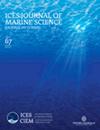Predicting important fishing grounds for the small-scale fishery, based on Automatic Identification System records, catches, and environmental data
IF 3.4
2区 农林科学
Q1 FISHERIES
引用次数: 0
Abstract
Effective and sustainable management of small-scale fisheries (SSF) is challenging. We describe a novel approach to identify important fishing grounds for SSF, by implementing a habitat modelling approach, using environmental predictors and Automatic Identification System (AIS)-B data coupled with logbook and First Sales Notes data, within the SE Bay of Biscay. Fishing activity patterns and catches of longliners and netters are used to determine the main environmental characteristics of the fishing grounds, and a habitat modelling approach is implemented to predict the zones that fulfil similar environmental characteristics across a larger geographical extent. Generalized additive mixed models (GAMMs) were built for 24 fish species, and to identify other zones that fulfil similar characteristics and, thus, could be considered relevant for the species targeted by each gear type. Most of the models showed a good prediction capacity. The models included between one and four predictor variables. ‘Depth of mixing layer’ and ‘benthic rocky habitat’ were the variables included more frequently for fish species captured by netter’s fleet. For longliners, the ‘seafloor slope’ and ‘benthic rocky habitat’ were the two most important variables. The predictive maps provide relevant information to assist in management and marine spatial planning.根据自动识别系统记录、渔获量和环境数据预测小型渔业的重要渔场
对小型渔业(SSF)进行有效的可持续管理具有挑战性。我们介绍了一种新方法,即在比斯开湾东南部使用环境预测因子、自动识别系统(AIS)-B 数据以及航海日志和首次销售记录数据,通过实施生境建模方法来确定 SSF 的重要渔场。捕捞活动模式以及延绳钓渔民和撒网渔民的渔获量可用于确定渔场的主要环境特征,而生境建模方法可用于预测在更大地理范围内满足类似环境特征的区域。为 24 种鱼类建立了广义加性混合模型(GAMM),以确定具有类似特征的其他区域,从而确定与每种渔具类型的目标鱼种相关的区域。大多数模型都显示出良好的预测能力。这些模型包括一至四个预测变量。混合层深度 "和 "底栖岩石生境 "是网船船队捕获鱼类时较常用的变量。对于延绳钓渔船,"海底坡度 "和 "海底岩石生境 "是两个最重要的变量。预测图提供了有助于管理和海洋空间规划的相关信息。
本文章由计算机程序翻译,如有差异,请以英文原文为准。
求助全文
约1分钟内获得全文
求助全文
来源期刊

ICES Journal of Marine Science
农林科学-海洋学
CiteScore
6.60
自引率
12.10%
发文量
207
审稿时长
6-16 weeks
期刊介绍:
The ICES Journal of Marine Science publishes original articles, opinion essays (“Food for Thought”), visions for the future (“Quo Vadimus”), and critical reviews that contribute to our scientific understanding of marine systems and the impact of human activities on them. The Journal also serves as a foundation for scientific advice across the broad spectrum of management and conservation issues related to the marine environment. Oceanography (e.g. productivity-determining processes), marine habitats, living resources, and related topics constitute the key elements of papers considered for publication. This includes economic, social, and public administration studies to the extent that they are directly related to management of the seas and are of general interest to marine scientists. Integrated studies that bridge gaps between traditional disciplines are particularly welcome.
 求助内容:
求助内容: 应助结果提醒方式:
应助结果提醒方式:


